GCP Blogs
GCP's Sunset Blog
![]() Established in October 2014, our Sunset Blog is a collection of our most captivating stories, as told by our partners, reflecting the legacy of 10 years of GCP. These joyful tales are full of life and rich with many voices. They focus on our crops, our partnerships, and the approaches that have made us unique – offering lessons learnt and visions for the future.
Established in October 2014, our Sunset Blog is a collection of our most captivating stories, as told by our partners, reflecting the legacy of 10 years of GCP. These joyful tales are full of life and rich with many voices. They focus on our crops, our partnerships, and the approaches that have made us unique – offering lessons learnt and visions for the future.
GCP Blog
![]() Graduating from the 'Web Academy' at the same time as our redesigned website in mid-2012, the GCP Blog is the flagship of our communication media mix. Here, we tell the human stories behind the science.
Graduating from the 'Web Academy' at the same time as our redesigned website in mid-2012, the GCP Blog is the flagship of our communication media mix. Here, we tell the human stories behind the science.
We invite you to visit our hyperactive blogosphere hotspot, and learn even more about the GCP world in vintage blog style – conversational, easy and informal, penned in everyday nontechnical language. We also have a blog-based exclusive and all-inclusive below...
Mutation from blog to print, PDF and e-books: Conversations on crop breeding – September 2014
Ahead of GCP's closure in December 2014, a selection of GCP blogposts (as at September 2014) was repackaged for print, with a limited print edition exclusively for participants at GCP’s final General Research Meeting in October 2014 (whose copies all run out, we're glad to report, thus elevating them to collector's items!). But we are also all inclusive: scroll down for e-versions of our special six-set September surprise package for everyone everywhere.
The Conversations on crop breeding compilation below is the first in a series of our three-tiered plan. Up next will be Continued conversations on crop breeding when we close the GCP Blog, to be followed by Closing conversations on crop breeding when we close the GCP Sunset Blog. Watch this space!
|
No. 1 The Generation Challenge Programme Firstly, we get up close and personal with the very essence of GCP, from being a freshly hatched Programme a decade ago, then fondly watch how the fledgling GCP learnt to fly with its own research projects. From there we soar to a bird’s-eye view to see the perspective from the GCP Executive Board, followed by a spell down on common ground to understand some long-lasting couplings with one of our most consistent funders through time. Finally, we join GCP’s very own ‘kingfisher’ to take a dive into the deep end of R4D where upstream meets downstream in the GCP whirlpool. |
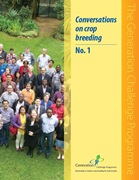 |
In GCP’s research meadow, discover the passionate scientists carrying out the many strands of breeding research – blowing in the wind like the grass-like cereals in the field, fighting to survive in a world with ever more drought, disease and poor soils. |
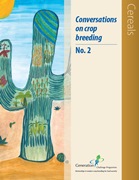 |
|
|
Join the scientific spectators who’ve gathered to see the erstwhile lowly legumes perform, playing a vital role for food security whilst replenishing soils with nutrients. GCP research has called in the talents of four legume stars: beans, chickpeas, cowpeas and groundnuts, with the spotlight on improving productivity by embracing modern breeding to overcome the twin villains of biotic and abiotic stresses. |
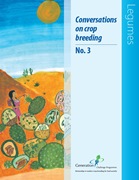 |
Find out how brave bananas and courageous cassava have triumphed in a world where complex crops have often been sidelined by global research funding. Discover how GCP researchers have been pushing the boundaries and stretching the possibilities of these once overlooked crops to produce robust and disease-resistant varieties through the power of molecular breeding. |
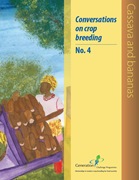 |
|
|
The conversation next turns to an under-represented sector of the research community: women in science who represent only 30 percent of the world’s researchers. GCP’s sisters in science show their mettle by soundly succeeding in their scientific sectors, whilst inspiring future generations of researchers to go forth and conquer! |
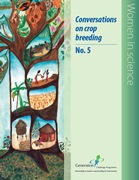 |
No. 6 Integrated Breeding Platform and capacity building GCP’s Integrated Breeding Platform (IBP) offers the global crop-breeding community the key to the informatics tool box – and is on hand with handy manuals and mentors to teach breeders exactly how to get the most out of new and emerging breeding tools. Add to this a comprehensive approach to capacity building that includes solid infrastructure interventions, and you have one integrated breeding force to reckon with! |
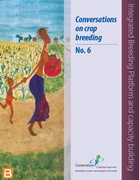 |
GCP in the media
-
2014
-
How to build research partnerships that benefit farmers
July 9, 2014EXTRACT: “A key challenge in true partnership is to strike the right balance between management that serves the programme as a whole and creating ownership so all partners can nurture a network...
-
-
2013
-
Plant breeding: Discovery in a dry spell
September 25, 2013EXTRACT: "Improved crops have helped farmers maintain yields in times of drought. But as climate change looms, will the gains keep coming? Building local capacity for research and development (R&D) can...
-
Sorghum farming key to food security – experts
May 15, 2013EXTRACT: "Patricia Ondere has been growing maize, beans and groundnuts on her two-acre farm in Sega, Siaya County, Kenya. She's lately added sorghum. Samuel Gudu, genetics and plant breeding...
-
New chickpeas set to increase food security
May 9, 2013EXTRACT: "Chickpeas are the world’s second most widely grown legumes, providing protein and acting as a staple food in the developing world. Known as the ‘orphan crop’ due to their narrow genetic base,...
-
In triplicate, genes make maize tolerant to toxic soil
March 22, 2013EXTRACT: "When plant scientists searched the maize genome for clues as to why some plants can tolerate toxic aluminium in soil, they found three copies of the same gene known to affect aluminium...
-
-
2012
-
Rooting and shooting for rice: getting to the root of the matter to increase production
August 27, 2012The article The protein kinase PSTOL1 from traditional rice confers tolerance of phosphorus deficiency, published in Nature on 22 August 2012, highlights a scientific breakthrough – the isolation of a...
-
Rio+20: CGIAR calls for equal sharing of natural resources
June 17, 2012AlertNet News Blog, 17 June – Rio+20: CGIAR calls for equal sharing of natural resources ...
-
-
2011
-
A powerful new partnership in plant science
January 2, 2011A powerful new partnership in plant science. Carried in January by: CAADP Seedquest...
-
-
2010
-
CGIAR develops toolkit for breeders
April 26, 2010Seed Week (2010). CGIAR develops toolkit for breeders. Volume 12, Issue 17, 27 April 2010. View article
-
GCP Develops Molecular Marker Toolkit for Breeders
April 22, 2010Crop Biotech Update (2010). GCP Develops Molecular Marker Toolkit for Breeders. 23 April 2010. View...
-
Breeder's Delight
March 31, 2010CGIAR News (2010). Breeder's Delight. In: Special issue of CGIAR News focusing on the theme of Thematic Agriculture and Food Security.
-
New global initiative launched to harness biotechnology
March 4, 2010Africa Bio (2010). New global initiative launched to harness biotechnology. 5 March 2010. View article...
-
GCP Wheat Challenge Initiative launch workshop in China
March 3, 2010Chinese Academy of Agricultural Sciences (CAAS) (2010). GCP Wheat Challenge Initiative launch workshop in China (in Chinese). Article featured in CAAS website, 4th March 2010. View article...
-
Biotechnology: Potential boon for smallholder farmers, if prioritized
February 28, 2010Centro Internacional de Mejoramiento de Maíz y Trigo (2010). Biotechnology: Potential boon for smallholder farmers, if prioritized. CIMMYT Informa No. 1693, March 2010, Texcoco, Mexico (relates to...
-
Taking Stock of Biotech
February 28, 2010CGIAR News (2010). Story of the month: March 2010 – Taking Stock of Biotech. View article
-
New initiative will harness biotech to improve developing countries’ plant breeding efficiency
February 25, 2010Crop Biotech Update (2010). New initiative will harness biotech to improve developing countries’ plant breeding efficiency. 26 February 2010.
-
MBP launched to improve breeding efficiency in developing countries by harnessing biotechnology
February 25, 2010Food and Beverage News, India (2010). MBP launched to improve breeding efficiency in developing countries by harnessing biotechnology. 26 February 2010. View...
-
The seeds of progress
February 21, 2010Denny-Dimitriou J (2010). The seeds of progress. Witness newspaper, 22 February 2010, South Africa. (Relates to SP3 project G4008.17: Application of Marker-Assisted Selection for Striga resistance...
-
Molecular Breeding for a Hunger-Free World
February 16, 2010International Crops Research Institute for the Semi-Arid Tropics (ICRISAT). Molecular Breeding for a Hunger-Free World. ICRISAT Happenings No. 1402, 19 February 2010 (relates to GCP’s Molecular...
-
Molecular markers made easy: the Generation Challenge Programme’s Molecular Marker Toolkit
January 17, 2010SeedQuest (2010). Molecular markers made easy: the Generation Challenge Programme’s Molecular Marker Toolkit. 18 January 2010. View...
-
Molecular markers made easy: the Generation Challenge Programme’s Molecular Marker Toolkit (GIPB )
January 3, 2010Global Partnership Initiative for Plant Breeding Capacity Building (2010). Molecular markers made easy: the Generation Challenge Programme’s Molecular Marker Toolkit. A web article on GCP's...
-
-
2009
-
Resource Center for global plant scientists
November 30, 2009Fulton T (2009). Resource Center for global plant scientists. A section on social media website 'Facebook' dedicated to GCP's Interactive Resource Center & Helpdesk. Visit site...
-
Crop improvement technology provides benefits to developing countries
November 30, 2009Greiner L (2009). Crop improvement technology provides benefits to developing countries. Article published in Innovations from the College of Agriculture and Life Sciences at Virginia Tech and...
-
Le séquencage du génome du bananier démarre
November 26, 2009Biofutur (2009). Le séquencage du génome du bananier démarre. Biofutur, 27 November 2009, France. PDF
-
Cassava breeders benefit from SNP workshop
September 30, 2009Southern Education & Research Alliance (SERA) (2009). Cassava breeders benefit from SNP workshop. Article published in SERA e-news, October/November 2009, Vol 6, No 5. Read...
-
GCP launches its Molecular Breeding Platform
September 10, 2009Food Security and AgBiotech News (2009). GCP launches its Molecular Breeding Platform. Press release posted by Meridian Institute, 11 September 2009.
-
GCP launches a public platform for plant molecular breeding in the developing world
September 7, 2009Corporate Social Responsibility Africa (2009). GCP launches a public platform for plant molecular breeding in the developing world. 8 September 2009.
-
Initiative launched to bring molecular plant breeding tools to the developing world
September 7, 2009Philanthropy News Digest (2009). Initiative launched to bring molecular plant breeding tools to the developing world. 8 September 2009.
-
Global Partnership Initiative for Plant Breeding Capacity Building (2009). GCP training material
September 6, 2009Global Partnership Initiative for Plant Breeding Capacity Building (2009). GCP training material. View...
-
New project aims to enhance plant breeding efficiency in the developing world
September 3, 2009Crop Biotech Update. New project aims to enhance plant breeding efficiency in the developing world. 4 September 2009.
-
CGIAR's Generation Challenge Programme launches a public platform for plant molecular breeding in the developing world
August 31, 2009Seedquest (2009). CGIAR's Generation Challenge Programme launches a public platform for plant molecular breeding in the developing world. 1 September 2009. View article...
-
GCP launches a public platform for plant molecular breeding
August 31, 2009SciDev.net (2009). GCP launches a public platform for plant molecular breeding. View...
-
Getting to the bottom of rice
July 12, 2009Max Planck Institute for Developmental Biology (2009). Getting to the bottom of rice. View article. Related GCP project is Commissioned project G4005.35 ‘Sequencing multiple and diverse rice...
-
PhilRice eyes flood-tolerant rice
June 8, 2009Olchondra RT (2009). PhilRice eyes flood-tolerant rice. Philippine Daily Inquirer, June 9, 2009. View...
-
-
2008
-
Scientists restrategize on cassava breeding for emerging markets
October 30, 2008Amuwa D (2008). Scientists restrategize on cassava breeding for emerging markets. Cassava breeding community of practice. Punch Newspapers, 31 October 2008, Nigeria. ...
-
Deciphering the code
June 30, 2008McNally KL and Cairns JE (2008). Deciphering the code. Rice Today 7, pp 36-37. PDF
-
Planting the seeds of Cyberinfrastructure: new projects nurture plant bioinformatics
June 12, 2008BioInform (2008). Planting the seeds of Cyberinfrastructure: new projects nurture plant bioinformatics, by Vivien Marx. 13 June 2008. ...
-
Learning from the green revolution
April 23, 2008The Why Files (2008). Learning from the green revolution. 24 April 2008 (featuring GCP Project G3008.07: Basal root architecture and drought tolerance in common bean). Requested interview. Read...
-
-
2007
-
The DNA Files: aluminium-tolerant sorghum
December 5, 2007Kochian L (2007). Interview on the research on the cloning of the sorghum aluminum tolerance gene on nationally broadcast National Public Radio programme. WSKG. The DNA Files, 6 December 2007. ...
-
UCR Researchers Awarded Nearly $1.7 Million to Develop Improved Cowpea Varieties
November 5, 2007University of Calfornia-Riverside (2007). UCR Researchers Awarded Nearly $1.7 Million to Develop Improved Cowpea Varieties. Press Release , 6 November 2007, UC-R, USA. Press...
-
Sh 2 billion project to boost legume production in Africa
November 2, 2007Saturday Standard (2007). Sh 2 billion project to boost legume production in Africa. Article published in Science and Environment section. 3 November 2007, Kenya, p 22.
-
Research to benefit African farmers
October 31, 2007University of California (2007). Research to benefit African farmers. November 2007. Video and text
-
Sorghum, one of world's major cereals, may get yield boost as toxicity-tolerant gene is cloned
August 26, 2007Kochian L (2007). Sorghum, one of world's major cereals, may get yield boost as toxicity-tolerant gene is cloned. Article in Cornell Chronicle, 27 August 2007, Cornell University, USA. View article...
-
Creation of drought resistant cowpea
August 25, 2007Muranaka S (2007). Creation of drought resistant cowpea. NHK radio world, Japan, 26 August 2007, 17:00-8:30 (Japanese time).
-
Agriculture on unstable rain
May 30, 2007Muranaka S (2007). Agriculture on unstable rain. Nihonkai shinbun, Japan, May 31, 2007. View article
-
Media
Media links

If so, you're safely home. A warm welcome home from your fellow communicators!
The 'Newsroom' is highly recommended for a rapid run through the ABCs of GCP, including an onward link to a glossary for crypticterms you might have found (or will find) in our content. But we also have loads of other intersting stuff in everyday language through the links on this page (see right).
Prefer a visual experience? For that, we recommend this five-minute ISF video on plant breeding. It succinctly outlines the work needed and steps to take to develop a new plant variety, and the time and resources this requires.
If the social media and networking scene is your cup of tea, see our accounts at the very top and bottom of this page.We also have helpful Alt text to crack the more cryptic ones of these, so just mouse-hover and all will be deciphered.
Still can't find what you are looking for, or you prefer to reach us via email? Then please This email address is being protected from spambots. You need JavaScript enabled to view it. !

 GCP News keeps you abreast of the latest events and opportunities from both GCP and the wider crop science community. Subscribe to our free e-newsletter here. Back issues can be accessed in the lowest menu on the left-hand side.
GCP News keeps you abreast of the latest events and opportunities from both GCP and the wider crop science community. Subscribe to our free e-newsletter here. Back issues can be accessed in the lowest menu on the left-hand side.
Subcategories
-
News & updates
- Article Count:
- 279
-
Feature stories
- Article Count:
- 19
-
GCP in the media
- Article Count:
- 45
-
Press releases
- Article Count:
- 22
-
Newsroom
GCP links basic science with applied research through a broad network of plant scientists from diverse backgrounds, working at CGIAR Centres, in academia and regional and country research programmes. This network generates knowledge, explores new allelic diversity and develops practical tools such as molecular markers for desirable traits to increase the efficiency of plant breeding in developing countries. The overall goal is to produce better crop varieties for resource-poor farmers in drought-prone and harsh environments. For a rapid overview on the ABCs of plant breeding, we recommend this five-minute ISF video. It succinctly outlines the work needed and steps to take to develop a new plant variety, and the time and resources that are needed in the process.
- Article Count:
- 10
-
Newsletters
- Article Count:
- 20
-
Issues 2012
- Article Count:
- 1
-
Issues 2013
- Article Count:
- 6
-
Issues 2014
- Article Count:
- 11
-
News items - related pages
- Article Count:
- 1



